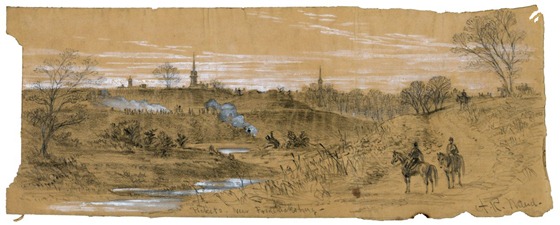5th.—Broke camp this morning, marched southerly through the village of Stafford, the most miserable and dilapidated looking place the imagination can picture, unless it should take for its pattern some other Virginia village. About a mile and a half south of Stafford Court House we crossed, at Brooks’ Station, the railroad leading from Fredericksburg to the mouth of Acquia Creek, and, after marching about one mile further, in the night, we bivouaced in a most woe-be-gone, hilly, pine-covered, tobacco-eaten country.
Shortly after passing Stafford Court House, I rode up to some “negro quarters,” to see if I could get a canteen of milk, or something “fresh” for my supper. An old black woman came to the door, expressed gratification at our arrival, and fears that we should not be able to retain our hold in the country. She seemed about seventy years old. I asked her if she cared anything for her freedom, or whether she would rather continue a slave, and be taken care of by her master?
“Ah, massa, my freedom ain’t wuf much to me now, but if it please de Laud, I would love to live to see dis a Free State; seem like’t would be so good to die in a free country, and den when I sings praises in hebben, it would be so nice to tell de Laud to his face, how I lub him for dat goodness.”
The slave may be “satisfied with his condition,” but it strikes me that this expresses a strange yearning for change in a mind already satisfied.
December.—Nothing special from 1st to 5th; on evening of 5th, went on picket five miles out; snowed until about ten inches deep; very cold.
December 5 — It seems that the Yankees that drove in our pickets at Front Royal a few days ago went back through Chester’s Gap to eastern Virginia, and early this morning we were on the march again down the valley toward Winchester. At Bartonsville, six miles from Winchester, we left the pike and moved one mile east of Bartonsville and camped. This is very disagreeable weather for practical soldiering. It snowed all day and when we stopped in the woods late this evening to camp the snow was about four inches deep, and still snowing fast. This is a sort of scout we are on now, and we have no tent to shelter us from the inclemency of the wintry weather. Camping in a four-inch snow, without tents, is bordering on the verge of roughing it, like Indians; but old campaigners are nearly always equal to all the-demands of all kinds of emergencies, even when mixed up with snow. It was getting dark when we drove into the snowy, cheerless woods to camp. It took but a few moments to unsaddle and hitch our horses; then we divided our mess into fatigue of twos. Two went in search of straw for bedding, two chopping wood, two getting supper out of almost nothing, and two building shelter. The straw party soon got back with as much straw as they could carry, as they found a big stack not far away. Then the straw detail assisted the architects in constructing our castle for a night. In about an hour after we commenced operations supper began to smell good, and our house was finished and furnished and the bed-chamber ready for occupation. Our structure is built in the modern hog-nest style of architecture — a shed roof covered with a waterproof tarpaulin. The front is open and facing a rousing camp-fire of green hickory, and now as I am trying to write it is nearly ten o’clock. The fire is burning brightly in front of our house and flashing its cheerful dancing light all over our bed-chamber. The snow is still coming down fast and the woods are wrapped in a wintry shroud, but who cares for snow?
Friday, 5th—The rain continued all night. We were relieved from picket this morning about 9 o’clock. Troops are passing to the front and there is some heavy cannonading in that direction.
Friday, December 5. — Making sand walks around quarters. A threatening morning and a snowy day. General Scammon passed today with his staff for Fayette: Captain James L Bottsford, First Lieutenant A. C. Reichenbach, [and] Headington, of Thirtieth. A good staff. Captain Hildt, of Twelfth, provost marshal. Bottsford and Reichenbach of Twenty-third dined with us on their way up to Fayette. General Scammon commands all south and east of Kanawha River; General Crook all north of same; both under Major-General Cox.
To Mrs. Lyon.
Fort Henry, Dec. 5, 1862.—We had a lovely snow storm last night, three inches deep, but the weather is mild. Our expedition is postponed in consequence until further orders. I should not wonder if it turned out one ‘grand fizzle,’ after all.
Friday, 5th. As we neared Cowskin a good many bushwhackers showed themselves, but at a distance. Camped three miles north of Elk Mills.
Enroute, Friday, Dec. 5. Took up the line of march through mud and rain early. In the morning the rain that was continually falling made the road almost unpassable for the artillery. Crossed the Tallahatchie with difficulty, passed fortifications which might have given us much trouble to pass had they been held by their builders. Met thirty prisoners. Halted at Abbeville about two hours at noon, then pushed on. Night overtook the train while crossing a lagoon [Herrington’s Creek], which was very difficult. Stood in the road till 8 P. M., when finding it impossible to cross, we came into park on the road-side in an old cornfield, slept on the tarpaulin, no shelter.
Friday, 5th—Snowed all day. I rode to Alexandria and went out to Mr. Bass’, seven miles, got there about night. I found all well.

Title inscribed below image.
circa December 1862
Medium: 1 drawing on tan paper : pencil and Chinese white.
Signed lower right: A R Waud
Library of Congress image.











